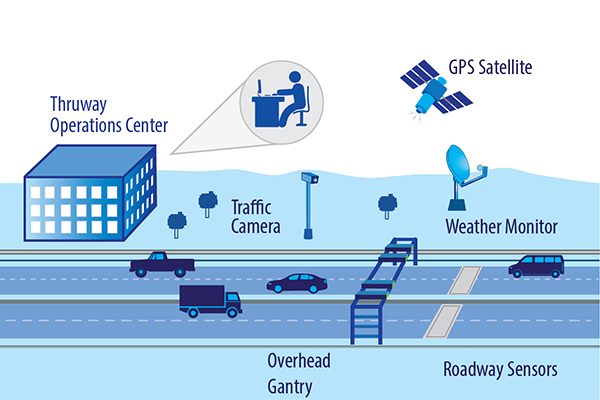
Electronic signs will help inform drivers of traffic conditions on the new bridge.
Tappan Zee Constructors (TZC) recently installed the first of 18 overhead gantries, which will be equipped with enhanced technology to help keep traffic moving safely and efficiently on the new bridge.
Intelligent Transportation Systems (ITS) will improve traffic safety and mobility by monitoring conditions on the twin-span crossing and automatically informing New York State Thruway Authority staff of any disruptions. This will allow for quick and concise communication with motorists through the bridge’s overhead electronic signs, and similar signage on its Westchester and Rockland landings.
These signs will inform motorists of accidents and direct them away from closed lanes, helping drivers to avoid last-second lane shifts, thus reducing the potential for other incidents.

Many ITS elements will combine to form a robust transportation network.
ITS will also serve as a valuable communication tool between the Thruway Authority, law enforcement, first responders and tow truck operators. By alerting emergency personnel as quickly as possible, the impact of lane closures and accidents can be minimized.
The new bridge’s ITS will connect to the Thruway’s larger traffic management network to help synchronize various operations, including maintenance and repairs. Additionally, during the winter months, the state-of-the-art system will monitor pavement conditions in real-time so roadway treatment and snow removal operations can function more efficiently. These enhancements have been shown to minimize delays to motorists, allowing the public to get the most out of its investment in roads and bridges.
Other ITS elements on the new bridge include traffic cameras, roadway weather systems, and emergency phones. These phones will be placed along the shoulders of the twin spans as well as on the shared-use bicycle and pedestrian path for those who need assistance.
Many of these ITS elements, including the overhead signage, are designed to make long-term maintenance efforts more efficient while minimizing disruptions to traffic. Specially-designed gantries, ladders and walkways will also allow workers to safely perform certain routine maintenance without the need to close travel lanes.
These features will combine to form a robust transportation network on the Thruway’s first cable-stayed crossing that will get travelers to their destinations with greater ease and improved safety.
